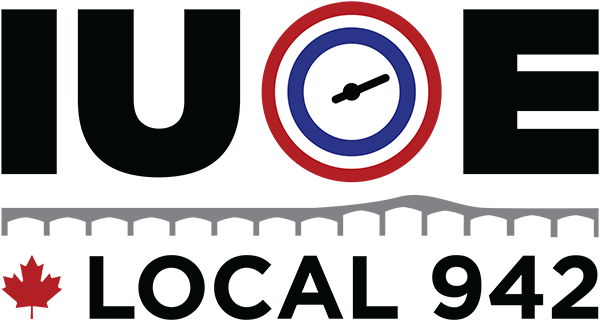ORGANIZE

Steps to Organizing Your Workplace
If you are interested in forming a union in your workplace, here are the general steps to follow in PEI:
1. Contact us! We can discuss the benefits of having us represent you and help you determine if you need a union in your workplace.
2. Talk to your coworkers and gather support for the union.
3. If you think that a majority of your coworkers want to unionize, gather evidence of your co-worker’s support for the union. This can take the form of an application for membership in the union along with a small, symbolic payment of dues, or a signed statement declaring that you wish to certify IUOE Local 942 as your bargaining agent.
4. Once you have gathered evidence from your coworkers supporting the union, the application for certification must be filed with the Labour Relations Board of PEI (“Board”).
5. The Board will certify the union as bargaining agent if it is satisfied that a majority of the employees support the application for certification. The Board may hold a representation vote, but if it is satisfied from the evidence filed that the union has majority support, it may also certify the union without holding a vote.
6. The Board will issue a Certification Order. Once this Order is received, the union will file notice with the employer to bargain a first collective agreement.
Forming a Union on Prince Edward Island

Do the above steps apply to all workplaces in PEI?
No. The above process applies to provincially regulated workplaces that fall under PEI’s Labour Act. Some workplaces, such as banks, interprovincial transport companies, airlines, radio and television broadcasters, and postal or courier services, are federally regulated and fall under the Canada Labour Code.
The process is similar and most importantly, we can also assist you with an application to certify a federally regulated workplace.
Can my employer fire me for talking about forming a union?
Not legally. PEI’s Labour Act stipulates that it is an unfair labour practice to discriminate against an employee, including terminating, disciplining, transferring, and so forth, because that employee is a member or has applied to be a member of a trade union. If this is a concern for you, please contact us to discuss.
Will my employer see the list of employees who have signed up to support the union?
No. The Labour Board will not disclose the applications for membership or declarations to your employer or inform them which employees support forming a union.
My employer is not opposed to having a union in the workplace. Is there an easier way to unionize?
Yes. If you think your employer will agree to the formation of a union, we can approach the employer about agreeing to voluntarily recognize the union. This would avoid the need for a Labour Relations Board of PEI (“Board”) application and generally-speaking, it is a simpler process.
What help will I receive from IUOE Local 942 in organizing my workplace?
We would assist you every step of the way:
- Developing talking points to help you convince your co-workers that they should support forming a union;
- Providing you with the applications for membership or statements of support you will need as evidence of support;
- Filing the Application for Certification and any related legal processes that follow;
- Filing the Notice to Bargain and negotiating the collective agreement;
- Enforcing the collective agreement once the first agreement is reached.
FAQ: General Questions About Unions
Answers to some frequently asked questions about being in a union for those new to the labour movement and those who’ve been in a union a while but have never really known why.
If you have any other questions you’d like to see answered on this page, please let us know!
What is a union?
A union is a group of workers who join together to give themselves a stronger voice for important workplace issues, such as wages, workplace safety, benefits and much more.
Employers have a massive negotiating advantage in workplaces without a union and are largely free to ignore the demands of most of their workers. Unions enable workers to level the playing field with the employer and bring an element of democracy to their workplaces.
How does the union work?
IUOE Local 942 is a democratic organization. Members can elect the Local leadership, the Board of Directors, their workplace steward and the negotiating team for collective agreement negotiations.
What is collective bargaining?
The terms and conditions of employment in a unionized workplace are set out in a contract called a “collective agreement.” The Union, through its elected representatives, and the employer, meet to negotiate a new collective agreement when the agreement in place expires. When the Union and the Employer’s negotiations result in a tentative agreement, the membership covered by the collective agreement have the opportunity to vote on the proposed new contract. If they approve, the tentative agreement is “ratified.”
If negotiations fail to produce a tentative agreement, or if the membership rejects a tentative agreement, the result may be a strike or lockout. In some workplaces that do not have the right to strike, an arbitrator may be called upon determine the outstanding bargaining issues in a process called “interest arbitration.”
What is a collective agreement?
A collective agreement is an employment contract that applies to all members in the “bargaining unit.” Collective agreements outline a wide range of issues.
Just some of the issues they might cover are: wages and wage progression; benefits; pension contributions; vacation entitlement; sick leave; overtime procedures; workplace safety; and many others.
Why are unions important?
Unions play a pivotal role in lives of all workers by advancing their interests, voicing their concerns, pushing for greater working standards in their workplaces and continuing the fight for economic justice. In addition to the gains obtained for members through collective bargaining, unions champion the rights of non-unionized workers as well.
Many of the advancements in working standards over the past 150 years in Canada are a result of the tireless efforts of the labour movement. Just a few examples: the eight hour work day, the 40 hour work week, worker’s compensation, unemployment insurance, health and safety legislation, maternity and parental leave, and minimum wage.
Why join a union?
Collective bargaining allows unionized workforces to fight for the improvement of workplace conditions. Moreover, existing rights can be more easily enforced with a union in place to police the collective agreement. The protections of a union also permit workers to bring forward innovative ideas concerning the workplace or to voice concerns without fear of retribution.
What can the union do for me?
There are many benefits to having a union in the workplace.
- Union wages and benefits are often better than their non-union counterparts.
- A union offers protection against discipline and termination without just cause. Many mistakenly believe that non-union employers cannot fire you unless they have a legitimate reason. This is untrue: as long as a non-union employer is not violating the Human Rights Act and will provide you with enough notice or pay in lieu of notice, an employer is largely free to replace you without any cause. By contrast, collective agreements can protect union members from unjust discipline and dismissal.
- If your rights under the collective agreement have been violated, the union can file a grievance on your behalf and can argue that the employer owes you a remedy.
- Unions can prevent favouritism in the workplace in the areas of job competitions, promotions, raises, overtime, vacation scheduling – the union can ensure that the employer is treating everyone equally!
- Unions can advocate for safer workplaces and assist you if are worried about your health and safety at work.
- In some workplaces, the union can assist you in your efforts to have your position reclassified.
- And more!
Are unions expensive?
Everyone who falls under a collective agreement pays union dues to their bargaining representative. Usually, these dues are deducted directly off of your paycheque.
IUOE Local 942 members pay only 1.3% of their wages in dues. This is among the lowest rate in all IUOE locals across North America and among unions in Prince Edward Island. Considering all of the benefits of being in a union, this is a bargain. And don’t forget, your dues are tax deductible!
What is a union steward?
Your steward is the face of IUOE Local 942 in the workplace and your first point of contact with the union. They can assist with a myriad of workplace issues: representing you at some meetings with HR, enforcing the collective agreement, assisting with health and safety issues, and more! If your steward can’t help you, they might be able to direct you to someone who can.
